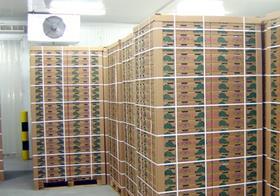
India requires an additional 9-10m tonnes of coldstorage capacity to address annual post-harvest losses of around Rs1tr (US$18.6bn), an industry report has found.
The report - titled ‘FDI in Retail – Advantage Farmers’ - was compiled by the Association of Chambers of Commerce and Industry of India and private sector lender, Yes Bank.
“Post-harvest losses of farm produce of fruits, vegetables and other perishables, have been estimated to be over Rs1tr per annum, 57 per cent of which is due to avoidable wastage and the rest due to avoidable costs of storage and commissions,' the report stated.
“India has nearly 23m tonnes of coldstorage facilities where as it currently needs at least 9-10 million tonnes more of capacity,' the report continued.
There are currently 5,386 standalone coldstorage facilities in the country.
The total warehousing capacity in India is 108.75m tonnes, whereas 35m tonnes of capacity is required in the 12th Five-Year Plan.
'In terms of value, market size of warehousing in financial year 2009 was Rs192bn and it grew to Rs228bn in financial year 2011 and is expected to grow to Rs351bn in financial year 2016 with a compound annual growth rate of 9 per cent. In this, only 12 per cent accounts for agri-warehousing and the remaining 88 per cent is for industrial purposes,' the report continued.
It added that following the easing of restriction on FDI in multi-brand retail, India expected to see an investment of over Rs400bn in that sector and the organised market was likely to grow to Rs4.8tr by 2016-17.
The report stated investment by major foreign players was expected to benefit farmers, suppliers, consumers and the economy.
India last month introduced controversial legislation allowing foreign investment of up to 51 per cent in the multi-brand retail sector. This, however, is limited to the 10 states and union territories that have so far agreed to implement the decision.



